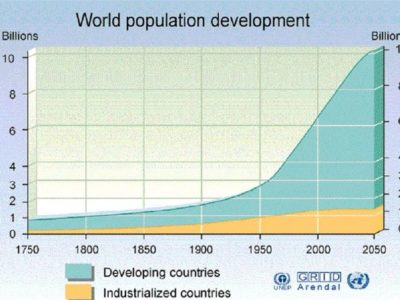2050: The Challenges Ahead
How will we cope with a huge population increase and climate change?
Let’s look past today’s political travails and think longer-range. What will things look like in 2050? There are more details below, but here’s the general picture. World population will probably grow by 2.5 billion people between now and 2050, with about half of the increase in Africa. Given historically weak economic growth in those areas with high population growth, water availability issues, and limits on agriculture, many of those areas will find it difficu...
CONTINUE READINGIs the Endangered Species Act a success?
Why the number of listed species that are no longer endangered is not a good measure of the Act's success
The Republican-controlled Senate Environment and Public Works Committee held hearings a couple of weeks ago on “reforming” the Endangered Species Act. (Coverage here and here, second link behind a paywall.) An important theme of the hearing was arguments by Republican Senators that the ESA has failed because only a small fraction of species listed for protection under the Act have fully recovered such that they no longer require ESA-protection anymore. (Species...
CONTINUE READINGThe End of the Cost-Benefit State?
Trump is targeting regulations for elimination even if their benefits exceed their costs.
Some scholars have proclaimed a vision of the regulatory state centering on cost-benefit analysis (CBA). They mean that quantitive comparisons of costs and benefits is now the foundation of regulatory decisions, arguably blessed by the Supreme Court in one of Scalia's last opinions. Environmentalists weren't convinced this was a good idea. Neither, as it turns out, is Donald Trump. He doesn't seem likely to abandon CBA, but his executive orders definitely put ...
CONTINUE READINGUnderstanding why California housing costs so much
Is the problem CEQA, local land-use regulations, both or neither?
Housing costs in the Bay Area and Los Angeles continue to get a lot of attention in the press and academic literature. This New York Times article highlights this recent paper from Ed Glaeser at Harvard and Joe Gyourko at Penn – the paper’s analysis concludes that land-use regulations have significantly increased the price of housing in cities like Los Angeles and the Bay Area. I don’t want to take issue with the underlying economic analysis in the Glaeser/Gyo...
CONTINUE READINGConservatives as Environmentalists
Environmentalism isn't an aberration in conservatives. It has deep roots going back to the 1960s.
Scott Pruitt's appointment as head of EPA illustrates how conservatism has become synonymous with anti-environmentalism. But that's really a drastic oversimplification, as I explain in a new paper about the history of conservative environmentalism. There were moments of strong environmentalism in the earlier days of the conservative movement. When he was running for mayor of New York City, William F. Buckley made a strong stand against air pollution, demanding...
CONTINUE READINGAbout that carbon tax idea….
Eric Biber posted last week about the proposal from several heavyweight Republicans for a carbon tax, outlined in a Wall Street Journal op-ed. Much has been said about the merits and problems of a carbon tax, including on this blog, so I will try not to repeat those points here. However, I wanted to expand on Eric’s analysis of a couple key points, and add some speculation on the politics surrounding the issue. At first glance, this proposal should be a source of ho...
CONTINUE READINGA Yawning Credibility Gap
Courts are supposed to defer to agencies. But that happens less often when an agency lacks credibility.
Two themes in the Trump Administration are distrust of experts and a willingness to overrule them on ideological grounds. But undermining the government's claims to expertise may come back to haunt the Administration. Because Trump is marginalizing government scientific and economic expertise, his regulatory initiatives may get less deference from the courts. There is already a great deal of concern regarding the integrity of government science under Trump. It’...
CONTINUE READINGTrump’s Environmental Assault Begins
Clean Power Plan, Waters of the U.S. Rules First on the Chopping Block But What Remains in Place Varies Dramatically
The Washington Post is reporting that the Trump Administration will very shortly roll out two executive orders to curtail environmental protection. These rollbacks follow on the heels of the Senate's confirmation of Scott Pruitt, who has made no secret of his antipathy for federal environmental regulations. The first executive order, as widely expected, will tell the Environmental Protection Agency to redo the Clean Power Plan. The CPP is at the heart of the Obama ...
CONTINUE READINGPublic Lands Watch: House Joint Resolution 69
House passes resolution to nullify regulation restricting hunting on Alaska National Wildlife Refuges
Additional update: The President signed SJR 69. Update: The Senate just passed S.J.R. 69. The House voted last week to pass House Joint Resolution 69. The resolution disapproves of the Fish & Wildlife Service rule, “Non-Subsistence Take of Wildlife, and Public Participation and Closure Procedures on National Wildlife Refuges in Alaska,” which was finalized on August 5, 2016. The resolution uses the Congressional Review Act (CRA), which allows Congress to di...
CONTINUE READINGThe GOP’s stealth carbon tax?
Republican proposals for border adjustment tax are equivalent to a carbon tax on oil
One of the leading proposals being floated by Republicans for tax reform is what is called a border adjustment tax. Put simply, it would tax corporate income on imports into the U.S. and leave income from exports tax exempt. The policy argument for it is that it would simplify tax administration for large, multinational companies operating in the U.S., and reduce incentives they currently have to park their profits outside of the U.S. to avoid corporate income tax. I ...
CONTINUE READING








